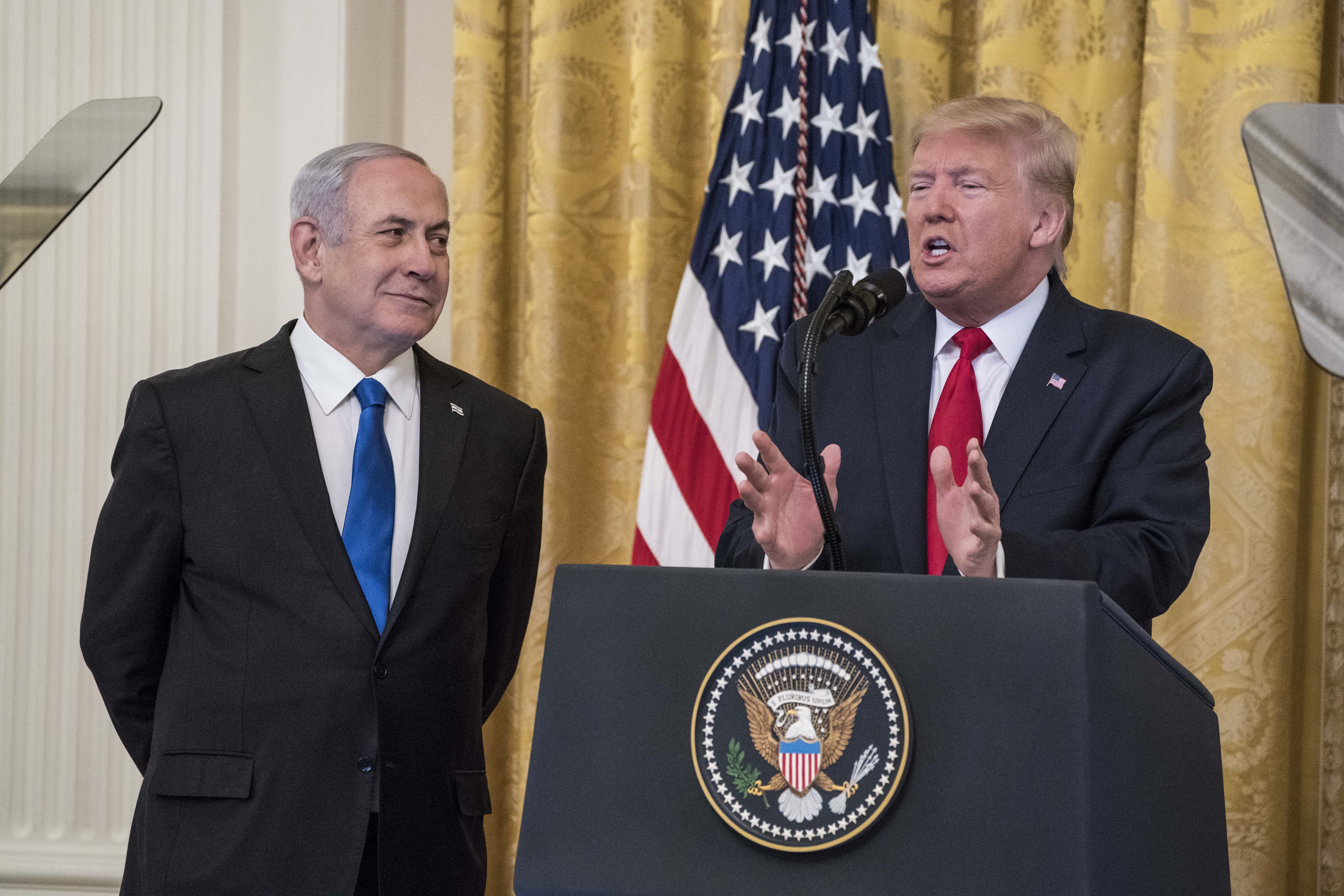 WASHINGTON, DC – JANUARY 28: U.S. President Donald Trump and Israeli Prime Minister Benjamin Netanyahu participate in a joint statement in the East Room of the White House on January 28, 2020 in Washington, DC. The news conference was held to announce the Trump administration’s plan to resolve the Israeli-Palestinian conflict. (Photo by Sarah Silbiger/Getty Images)
WASHINGTON, DC – JANUARY 28: U.S. President Donald Trump and Israeli Prime Minister Benjamin Netanyahu participate in a joint statement in the East Room of the White House on January 28, 2020 in Washington, DC. The news conference was held to announce the Trump administration’s plan to resolve the Israeli-Palestinian conflict. (Photo by Sarah Silbiger/Getty Images) Jewish groups expressed varying opinions on President Donald Trump’s proposed peace plan for the Israel-Palestinian conflict.
Trump unveiled the peace plan on Jan. 28; the plan involves Israel annexing settlements in Israeli territory in the West Bank and keeping Jerusalem as its capital. There would be a freeze in settlement building under the deal for four years and the status quo for the Temple Mount would be maintained.
Additionally, the remaining Palestinian territory – including the Gaza Strip – would become a de-militarized Palestinian state with eastern Jerusalem as its capital, under the condition that anti-Semitic rhetoric is removed from Palestinian textbooks. The U.S. would provide $50 billion to the Palestinians if they agree to the deal.
StandWithUs said in a statement that history has been replete with the Palestinians rejecting peace deal after peace deal.
“As the U.S. administration presents a new peace plan, we know that it is ultimately up to Israeli and Palestinian leaders to resolve their conflict through direct negotiation,” they said. “We firmly respect the right of Israelis to decide what they need in any peace agreement and urge Palestinian leaders to finally engage in good faith. We hope this will be a step towards a better future for both peoples.”
The Simon Wiesenthal Center said in a statement that they applaud the plan.
“The State of Israel has publicly committed to walk down this path that ensures Israeli security but it is now up to the Palestinians to decide if they want peace and prosperity or continued instability and hopelessness,” the statement read. “Rabbi [Abraham] Cooper, who attended today’s White House event, personally thanked the Ambassadors of Bahrain, Oman and the [United Arab Emirates] for their attendance at the historic event and their commitment to helping to build a more peaceful region for people of all faiths.”
They added: “[Palestinian Authority] President Mahmoud Abbas rejected the Peace Plan in a meeting which included terrorist organizations like Hamas and [Popular Front for the Liberation of Palestine], where he denied that Jerusalem will ever be Israel’s capital saying that the American media is controlled by Zionists and vowing to continue payments ‘To our prisoners, the wounded and the martyrs.’”
Christians United for Israel (CUFI) similarly issued a statement praising the proposal.
“The President’s vision ensures Israel’s defensible borders, a united Jerusalem, sovereignty over biblical holy sites, and provides an opportunity for the Palestinians to choose peace,” CUFI Founder and Chairman Pastor John Hagee said. “CUFI, as we have since our founding, stands with the decisions of the democratically elected government of Israel. We hope the Palestinian leadership will not miss yet another opportunity for peace in the region.”
Other groups, like J Street, opposed the plan.
“By endorsing Israeli sovereignty over vast portions of the occupied West Bank, the president and his team appear to be empowering Israeli leaders to carry out unilateral annexations that would flagrantly violate international law, trample on the rights of Palestinians and grossly endanger Israel’s future as a democratic homeland for the Jewish people,” J Street said in a statement. “They are discarding decades of bipartisan US policy in favor of a destructive effort that is certain to exacerbate the Israeli-Palestinian conflict, empower the most dangerous extremists on both sides and destabilize Israel’s already tenuous relationship with Jordan.”
Jewish Democratic Council of America Executive Director Halie Soifer told Newsweek, “If we have learned anything from the peace negotiations of the past three decades, it is that solutions cannot be imposed from the outside. They must be mutually agreed upon by the Israeli government and the Palestinian Authority. In the absence of such negotiations, imposed measures will impede future prospects for peace.”
UPDATE: Both the Anti-Defamation League and American Jewish Committee have weighed in.
“We currently are studying the Israeli-Palestinian peace plan released today by the White House and carefully considering its implications,” Anti-Defamation League CEO Jonathan Greenblatt said. “But ultimately the two parties must engage together on a settlement of the conflict, and so we hope that this might prompt both sides to resume negotiations toward a two-state solution that leads to a lasting and just peace.”
American Jewish Committee CEO David Harris similarly said in a statement, “there’s a potential basis here for starting talks in earnest and with the knowledge that there are important provisions — and, yes, painful concessions — for both sides. Accordingly, this ought to be a time for quiet exploration, discussion, and restraint in seeking to start the process of direct negotiations.”























 More news and opinions than at a Shabbat dinner, right in your inbox.
More news and opinions than at a Shabbat dinner, right in your inbox.